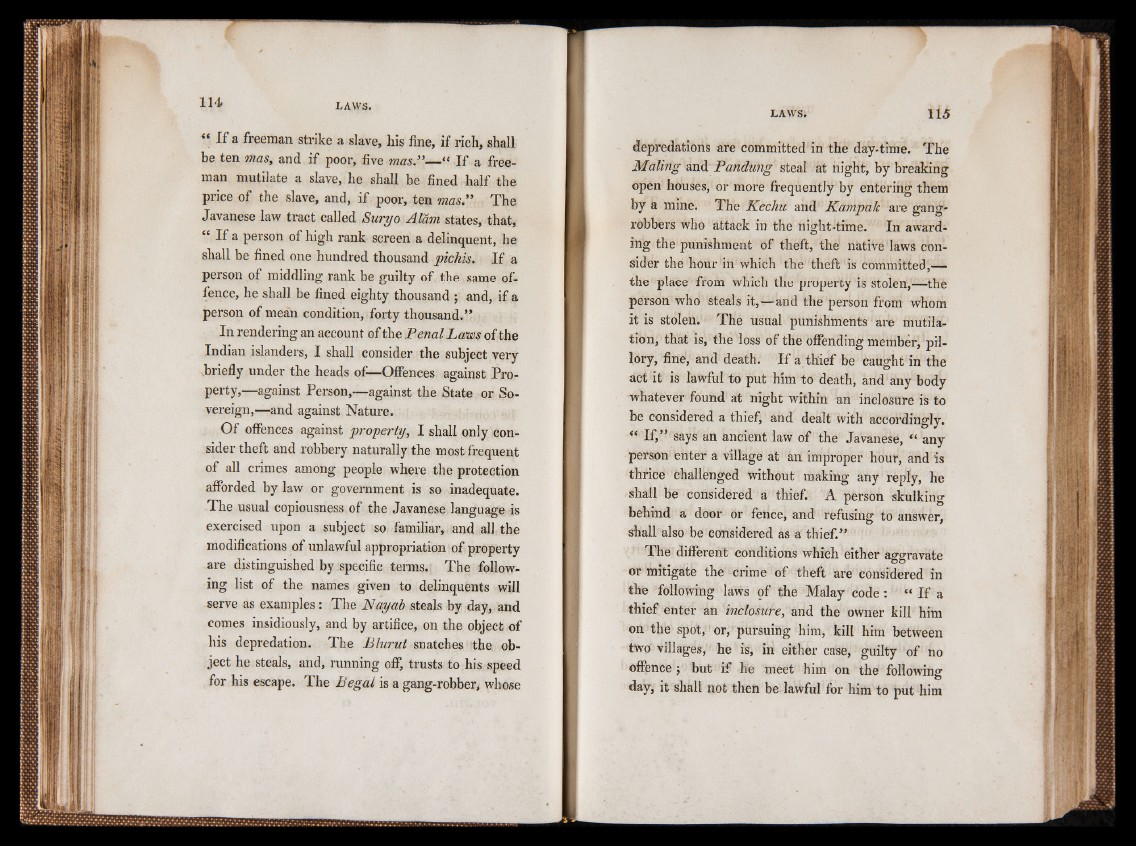
“ if a freeman strike a slave, his fine, if rich, shall
he ten mas, and. if poor, five mas.,,—ii If a freeman
mutilate a slave, he shall be fined half the
price of the slave, and, if poor, ten mas.” The
Javanese law tract called Suryo Alam states, that,
If a person of high rank screen a delinquent, he
shall be fined one hundred thousand pichis. If a
person of middling rank be guilty of the same offence,
he shall be fined eighty thousand ; and, if a
person of mean condition, forty thousand.”
In rendering an account of the Penal Laws of the
Indian islanders, I shall consider the subject very
briefly under the heads of—Offences against Property,—
against Person,—against the State or Sovereign,—
and against Nature.
Of offences against properly, I shall only consider
theft and robbery naturally the most frequent
of all crimes among people where the protection
afforded by law or government is so inadequate.
The usual copiousness of the Javanese language is
exercised upon a subject so familiar, and all the
modifications of unlawful appropriation of property
are distinguished by specific terms. The following
list of the names given to delinquents will
serve as examples: The JSayab steals by day, and
comes insidiously, and by artifice, on the object of
his depredation. The Blurut snatches the object
he steals, and, running off, trusts to his speed
for his escape. The Begal is a gang-robber, whose
depredations are committed in the day-time. The
Mating and Pandung steal at night, by breaking
open houses, or more frequently by entering them
by a mine. The Kechu and Kampak are gang-
robbers who attack in the night-time. In awarding
the punishment of theft, the native laws consider
the hour in which the theft is committed,—
the place from which the property is stolen,—the
person who steals it,—and the person from whom
it is stolen. The usual punishments are mutilation,
that is, the loss of the offending member, pillory,
fine, and death. If a thief be caught in the
act it is lawful to put him to death, and any body
whatever found at night within an inclosure is to
be considered a thief, and dealt with accordingly.
" If,” says an ancient law of the Javanese, “ any
person enter a village at an improper hour, and is
thrice challenged without making any reply, he
shall be considered a thief. A person skulking
behind a door or fence, and refusing to answer,
shall also be considered as a thief.”
The different conditions which either aggravate
or mitigate the Crime of theft are considered in
the following laws of the Malay code: ! “ If a
thief enter an inclosure, and the owner kill him
on the spot, or,'p u r s u in g him, kill him between
two villages, he is, in either case, guilty of no
offence y but if he meet him on the following dary ■ , •i t shall not then be lawful for him to put him^